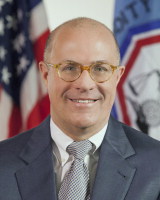
The hype behind virtual currency far outweighs its impact.
That was the surprising and blunt message from Christopher Giancarlo, the Chairman of the Commodities Futures Trading Commission.
“The amount of press coverage on this whole issue of virtual currency far outweigh the impact of the entire marketplace on the US and the global economy.”
It’s the latest in a series of provocative statements made by Giancarlo about virtual currency. At a previous hearing, he suggested that he considered most- there are now over one thousand different virtual currencies- virtual currencies a scam.
He’d also previously noted that there is a gender gap in virtual currencies- pointing out that his three college age children were all excited about virtual currencies in ways they weren’t excited about other investments, hinting that his generation may be missing something younger people are seeing.
Giancarlo on the Hill
Giancarlo made this statement downplaying the significance of virtual currency in an appearance in front of a committee the CFTC rarely visits, the House Appropriations Committee.
That’s because Giancarlo was testifying as part of the budget process and in support of a budget request for the CFTC of $281.5 million for fiscal year 2019, which starts in October 2018.
Giancarlo testified in front of the Agriculture, Rural Development, Food and Drug Administration, and Related Agencies sub-committee of the House Appropriations Committee in a hearing on March 7, 2018.
As has been previously noted in The Industry Spread, the power of the purse strings in the US lies solely with Congress, but the President submits a budget which is then debated by Congress and then often augmented.
Giancarlo was testifying as part of that process, noting of the budget request: “Working with our leadership team, we built this budget up from zero; every dollar we seek properly serves the agency’s mission to foster open, transparent and competitive and financially sound markets, free from fraud and manipulation, while respecting the American taxpayer through careful management of our resources.”
The CFTC and Virtual Currency
While the hearing was ostensibly about the CFTC’s budget, it was not surprising given the media attention its received, that the first question related to virtual currency.
Republican Congressman Robert Aderholt from the State of Alabama is the chairman of this sub-committee and he asked: “The advent of new futures approved just last year for bitcoin and other crypto-currencies seemed to have taken up the headlines recently. We read stories of people mortgaging their homes to invest in the market and those that have thrown away their bitcoin keys wanting to go through the city dumps and try to recover them in some way. Millionaires were made and lost overnight. You briefly mentioned the steps you’re taking to regulate the market in your written statement. Can you go about further in detail as to what role your agency plays in the regulation of this market and what other role agencies have?”
Though he downplayed the role of virtual currencies in the marketplace, this does not mean that Giancarlo has sat back in regulating them.
He outlined five steps the CFTC is taking in his answer to Aderholt.
- Assert its legal authority where appropriate
- Increase staff competency
- Robust consumer education effort
- Aggressive enforcement against fraud and manipulation
- Inter-regulatory agency cooperation
He also noted that regulation for virtual currency is complex.
“The CFTC’s authority is to regulate derivative markets, comprehensively.” Giancarlo stated. “When it comes to underlying spot markets- whether those are markets for commodities, whether they are markets for precious metals- we do not have regulatory authority. What we do have is fraud and manipulation authority, the ability to bring enforcement actions for fraud and manipulation at underlying markets. That’s been the case in our history at the CFTC and that’s is now how we approach virtual currencies. So, in the case of the two launched bitcoin futures at the CME and CBOE, we have comprehensive regulatory oversight. In the case of the underlying cash markets- well they’re not really cash markets because they’re traded in bitcoin, what we call spot markets in bitcoin- our authority is limited to enforcement of fraud and manipulation.”
As Congressman Aderholt noted, Giancarlo also detailed the agency’s regulatory plans for virtual currency in his written statement, and here’s part of that.
“In FY 2018, the exchanges self-certified several new contracts for futures products for virtual currencies. These innovations impact the regulatory landscape and with this budget request, the Commission will invest more in new technologies and tools that support important surveillance and enforcement efforts.
“Under the CEA (Commodity Exchange Act) and Commission regulations and related guidance, exchanges have the responsibility to ensure that their Bitcoin futures products and their cash-settlement process are not readily susceptible to manipulation, and DCOs have the responsibility of risk management to ensure that the products are sufficiently margined. The CFTC has the authority to ensure compliance with both. In addition, the CFTC has legal authority over virtual currency derivatives in support of anti-fraud and manipulation including enforcement authority in the underlying markets.
“The CFTC has been in close communication with the SEC with respect to policy and jurisdictional considerations, and in connection with our recent enforcement cases. We have also been working with the U.S. Treasury and the FSOC. In addition, we have been in communication with our foreign counterparts through bilateral discussions and the International Organization of Securities Commissions.
“In the past several weeks the CFTC has filed a series of civil enforcement actions against perpetrators of fraud and market abuse involving virtual currency. These actions and others to follow confirm that the CFTC, working closely with the Security and Exchange Commission (SEC) and other fellow financial enforcement agencies, will aggressively prosecute those who engage in fraud and manipulation of US markets for virtual currency.”









